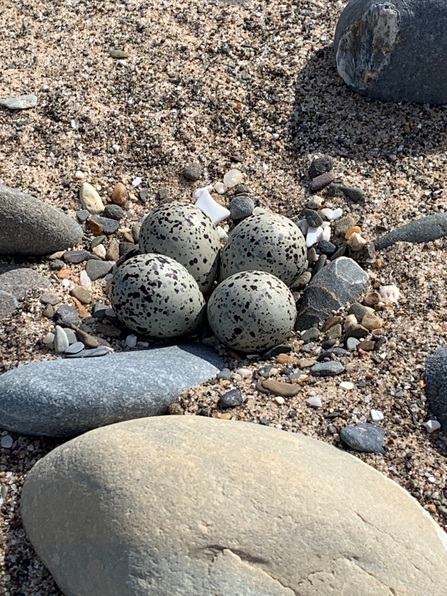
Ringed Plover eggs
Spot the eggs!
There are 3 oystercatcher eggs in this photo, showing just how well camouflaged they ere...

Ringed Plover eggs
A pair of Ringed Plover were found to be nesting on the upper beach during the Easter weekend, a time when the shoreline was seeing a high number of visitors enjoying the nice weather and stunning views. As all ground-nesting birds are susceptible to disturbance from people and especially dogs, the decision was taken to fence off 710 metres of the beach which is an Area of Special Scientific Interest.
MWT are pleased to report that since then, this pair of Ringed Plover successfully fledged four chicks, and that another pair have also since started nesting. Ringed Plover are specially protected by the Wildlife Act 1990 and are an Amber-listed bird of conservation concern. The most recent population estimate for the whole of the Isle of Man is just 39 pairs (BoCCIoM 2021), so with 5% of the Manx breeding population on our reserve it is vital that they are given the space and protection that they need to thrive.
Regular monitoring has also confirmed that another species is benefiting from the dedicated exclusion area, with one pair of Oystercatcher currently incubating eggs and another scouting out suitable nest sites. Although widespread along the Manx coastline, due to major population declines across Europe, Oystercatcher have been Red-listed on the Isle of Man and globally, being classed as ‘Vulnerable’ to extinction across Europe and as ‘Near Threatened’ with extinction globally by the IUCN.
MWT are pleased that the recent measures enacted at Cronk y Bing are making space for nature and allowing our ground-nesting species to breed in peace. We would like to remind everyone that the eggs of both species look very similar to pebbles and can easily be trodden on by both dogs and people. All dogs on the pebble and sandy beach of the northern coasts, stretching from Kirk Michael to Ramsey should be on a short lead from 1 April to 31 July, even in areas where no exclusion zones are in place. Disturbance is a particular problem at high tide, when people are forced to walk on the upper beach where these birds nest. The public are politely reminded that causing disturbance to a specially protected species can result in a fine of £10,000 for each offence and that the use of motor vehicles on the foreshore is prohibited by law. Thank you for your understanding and cooperation.

Spot the eggs!
There are 3 oystercatcher eggs in this photo, showing just how well camouflaged they ere...